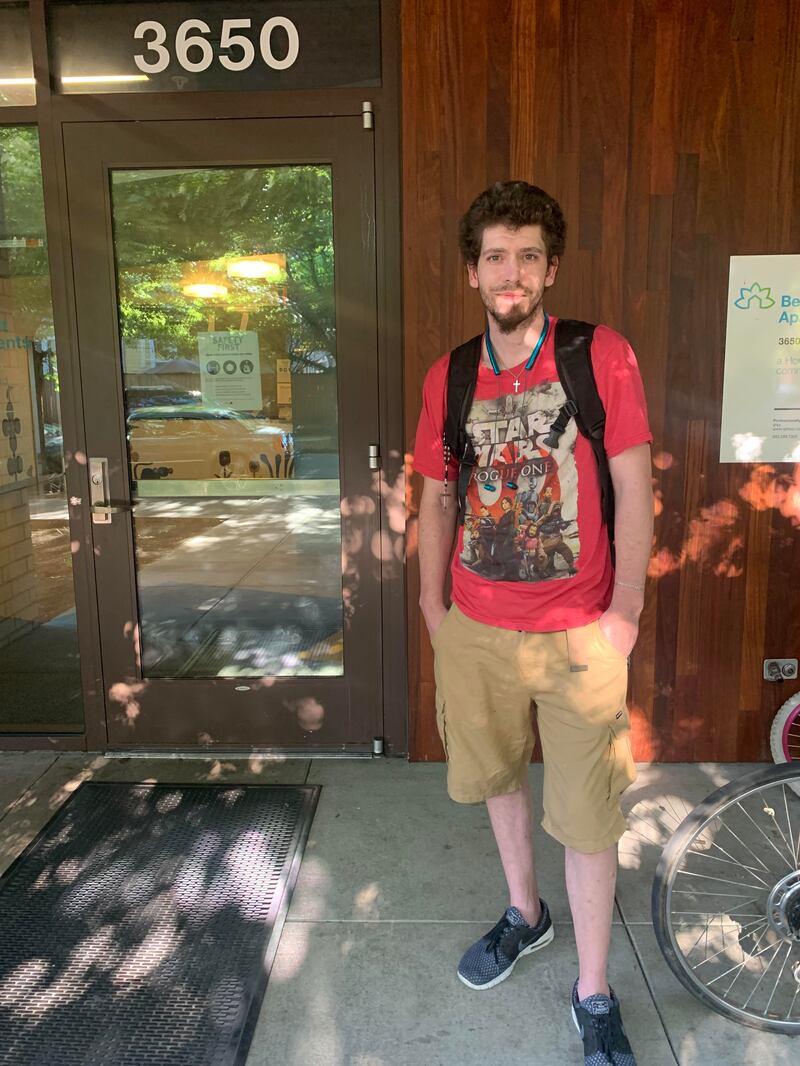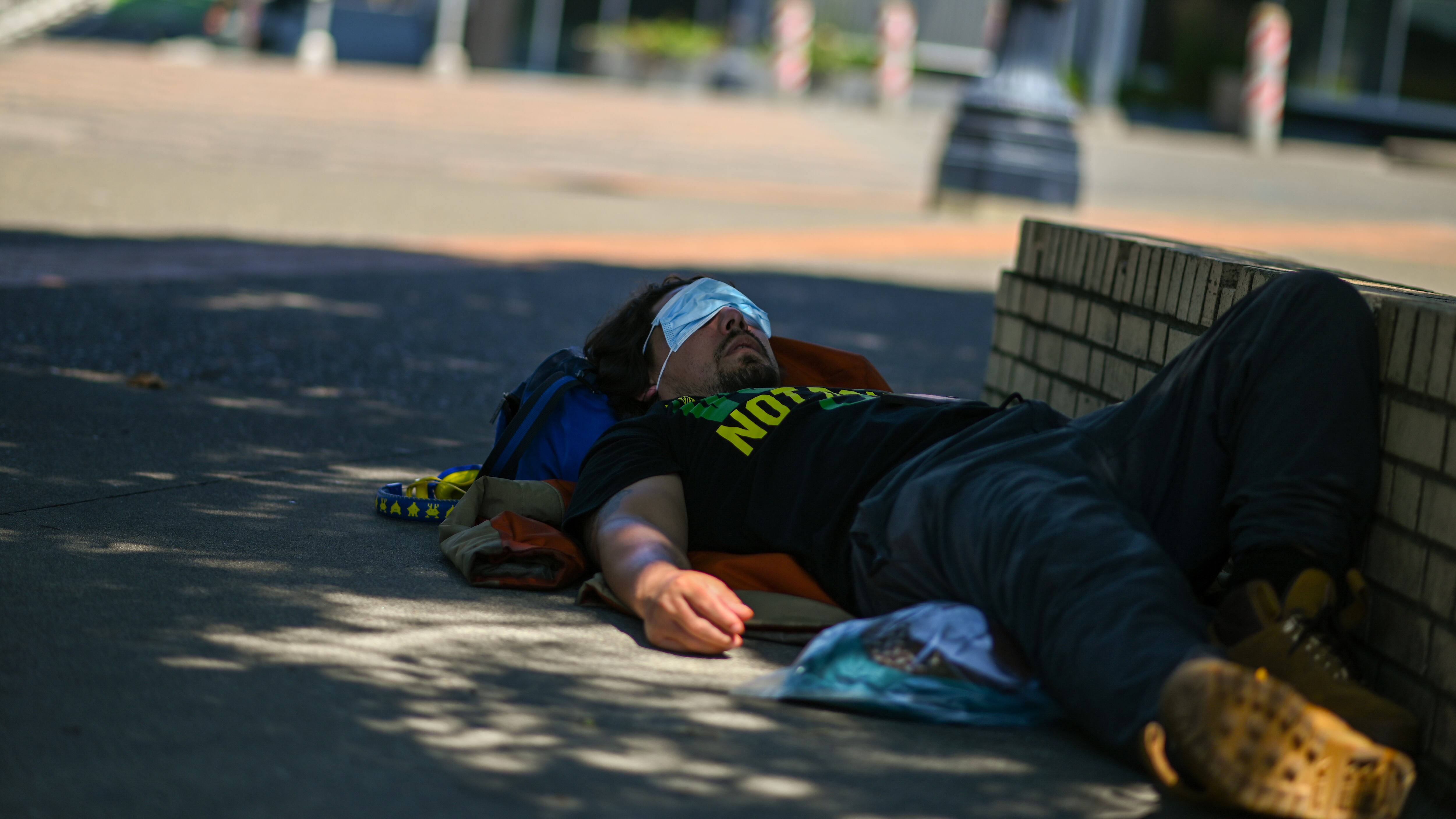People living in low-income apartment buildings without air conditioning describe riding out Portland’s historic heat wave in misery, trying to escape or cool their sweltering apartments.
John Brant is one such resident. Brant, who’s 70 years old and Black, has no air conditioning in a third-floor unit in the Allen Fremont Plaza, an affordable apartment complex for seniors along Martin Luther King Jr. Boulevard. The complex is managed by Reach CDC, an agency that provides affordable housing throughout Portland. Brant baked in his third-floor room, where he had nothing but two fans, which he says merely blasted him with warm air.
“They don’t do no good,” Brant says. “And I don’t have no AC. The only AC they have is in the hall. I couldn’t stay in my apartment. I had to stay in the hallway so I could get some air. A few others did, too.”
As of Friday, July 2, the Multnomah County death toll from the heat wave stood at 59. Most of those people were housed, the county noted, and the average age of the deceased was 68.
Some 21% of households in Portland don’t have air conditioning. Ahead of the heat wave, county officials warned that they were most concerned about people living in high-rise buildings without air conditioning—especially in the top floors.
Portland-area governments, led by Multnomah County health officials, scrambled last weekend to urge people in the most dangerous buildings to go to cooling shelters. But even limited interviews with the residents of low-income housing suggest the alert never reached many of the county’s most vulnerable people—even in buildings that government agencies fund or manage.
It remains unclear what kind of housing the 59 people who perished last weekend had. County officials initially declined to release addresses of deaths, and several local housing providers have not responded to requests from WW for a count of fatalities on their properties.
Home Forward, the largest provider of affordable housing in the state, tells WW it has identified two resident deaths in its buildings that occurred during the heat wave: “We are aware of two fatalities during the heat wave, one at Peaceful Villa and one at Noerthwest Tower, but not the causes of their deaths.”
Peaceful Villa is a collection of 69 one-story apartments located in the Richmond neighborhood in Southeast Portland.
Northwest Tower is a Section 8 building with 150 apartments in the Alphabet District of Northwest Portland. It’s 13 stories tall, and does not have central air conditioning in its units.
Home Forward spokesperson Monica Foucher tells WW the housing agency worked to keep its residents safe. “During the heat wave, our staff, particularly in community services, were out at the properties delivering water, checking on residents, and continuing to alert them to and help access available resources either on-site or in the community,” she wrote in an email.
Some exterior-facing windows along Allen Fremont Plaza, where Brant lives, are lined with cardboard and others have dark blankets shading them from the sun—likely relics from the weekend heat wave, when people took any measure they could to block out the sun.
Brant says he would take a shower early in the morning and then leave his room to be in the hallway, which was air-conditioned. He says no apartment manager ever knocked on his door to check on him—there’s 63 other units in the complex—and he doesn’t recall being told about resources to transport him to cooling centers. He says one day they did pass out bottled water.
“Nothing,” Brant says of what the complex did for him. “They don’t do nothing.”
On Friday evening, Brant played Jewels Switch, a mobile phone game, in front of the complex. It’s 82 degrees. But his room is 90 degrees—the reason he is sitting outside. He says he didn’t think much about the heat wave before it came; when it did come, he didn’t think much about it either, other than he was hot as hell.
“What is, is what is,” Brant says.
Across the parking lot from Brant is Nathan Schauer, who’s sitting in front of Beech Street Apartments waiting for his wife and 18-month-old daughter Louella to get back home from petting some goats a few blocks away.

The 32-unit complex is operated by Home Forward, and it’s the agency’s first sober living complex. The other half of the building is run by one of the agency’s partners LifeWorks NW, and it has 29 units for people currently in treatment.
Though Schauer lives with his grandparents in Vancouver, Wash., he spends most of his nights here with his family. He spent two of the three hottest nights in Portland’s history here, in his wife’s fourth-floor apartment.
They purchased a standing AC unit, and it helped keep the bedroom down to about 80 degrees throughout the day. Schauer says only the hallways were cool, and the apartment had a chillier community room that played movies during those three days.
“The window opens this much,” he says, his fingers stretched about 6 inches apart to demonstrate. “It’s so you can’t jump out the fourth floor.” So the window AC units, which tend to be cheaper, couldn’t fit in the windows—forcing him and his wife to buy a used standing unit.
They took refuge in their bedroom with the AC unit so they got more bang for their buck. But at night, when it started to get darker, they would turn off the AC unit to prevent increasing the electric bill.
“One of the nights, my wife had turned the AC off partway through the night because of the electric bill. I’m usually up most of the night, and I went and felt my daughter, who was in a pack-and-play in the room. The AC had only been off for an hour, and Louella was soaking wet with sweat. So I moved it closer to her and turned it back on.”
On the other side of town, in his unit at the Raintree Apartments at Southeast 187th Avenue and Yamhill Street, 39-year old Frankie Olivo is hanging out with his cat and dog.
Even though Olivo had his own AC unit last weekend, he said it only helped keep one section of his apartment cool—and it was still about 90 degrees the entire time. He had to get up early in the morning to walk his dog, and would again walk him late at night when the temperatures were more manageable.
Olivo says there was dead silence from the management company, Stark Firs Property Management, during the heat wave: “Usually they send us text messages about parking or when they’re shutting off the water, and we didn’t get nothing from them. For the most part, we just checked on each other.”
Stark Fir did not respond to a request for comment.
Olivo says the stakes were a little higher at his complex, because some of his neighbors have mental illnesses.
“We have a few neighbors that have schizophrenia, and I know one of them didn’t have AC,” Olivo says.
On Saturday night, when temperatures were still hot but not quite as insufferable as they would become the following two days, Olivo says a bunch of his neighbors brought their pets and kids out to the courtyard.
“Once it started to cool down, on Saturday when the sun had set, some of us came out in the courtyard to let our animals out, and some people had their kids out, and we were checking in on each other,” Olivo says. “And then the next day, no one came out.”
Have a story about the temperature in your apartment building during the heat wave? Contact Willamette Week at speel@wweek.com.

